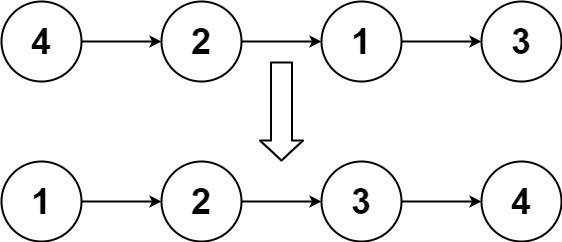Given the head of a linked list, return the list after sorting it in ascending order.
Follow up: Can you sort the linked list in O(n logn) time and O(1) memory (i.e. constant space)?
Example 1:
Input: head = [4,2,1,3] Output: [1,2,3,4]
Example 2:
Input: head = [-1,5,3,4,0] Output: [-1,0,3,4,5]
Example 3:
Input: head = [] Output: []
Constraints:
- The number of nodes in the list is in the range
[0, 5 * 104]. -105 <= Node.val <= 105
Companies:
Facebook, Adobe, Yahoo, Bloomberg, ByteDance
Related Topics:
Linked List, Sort
Similar Questions:
// OJ: https://leetcode.com/problems/sort-list/
// Author: github.com/lzl124631x
// Time: O(NlogN)
// Space: O(logN)
class Solution {
ListNode* splitList(ListNode *head) {
ListNode dummy, *p = &dummy, *q = &dummy;
dummy.next = head;
while (q && q->next) {
q = q->next->next;
p = p->next;
}
auto next = p->next;
p->next = NULL;
return next;
}
ListNode *mergeList(ListNode *a, ListNode *b) {
ListNode head, *tail = &head;
while (a && b) {
ListNode *node;
if (a->val <= b->val) {
node = a;
a = a->next;
} else {
node = b;
b = b->next;
}
tail->next = node;
tail = node;
}
if (a) tail->next = a;
if (b) tail->next = b;
return head.next;
}
public:
ListNode* sortList(ListNode* head) {
if (!head || !head->next) return head;
auto b = splitList(head);
return mergeList(sortList(head), sortList(b));
}
};// OJ: https://leetcode.com/problems/sort-list/
// Author: github.com/lzl124631x
// Time: O(NlogN) on average, O(N^2) in the worst case
// Space: O(logN) on averge, O(N) in the worst case
class Solution {
private:
void quickSort(ListNode *begin, ListNode *end = NULL) {
if (begin == end || begin->next == end) return;
auto p = partition(begin, end);
quickSort(begin, p.first);
quickSort(p.second, end);
}
pair<ListNode*, ListNode*> partition(ListNode *begin, ListNode *end) {
int pivot = begin->val;
ListNode *eqHead = begin, *eqTail = begin, *p = begin->next;
while (p != end) {
if (p->val <= pivot) {
if (p->val < pivot) {
swap(eqHead->val, p->val);
eqHead = eqHead->next;
}
swap(p->val, eqTail->next->val);
eqTail = eqTail->next;
}
p = p->next;
}
return {eqHead, eqTail->next};
}
public:
ListNode* sortList(ListNode* head) {
quickSort(head);
return head;
}
};// OJ: https://leetcode.com/problems/sort-list/solution/
// Author: github.com/lzl124631x
// Time: O(NlogN)
// Space: O(1)
class Solution {
pair<ListNode*, ListNode*> mergeList(ListNode *a, ListNode *b) {
ListNode head, *tail = &head;
while (a || b) {
ListNode *node;
if (!b || (a && a->val <= b->val)) {
node = a;
a = a->next;
} else {
node = b;
b = b->next;
}
tail->next = node;
tail = node;
}
return {head.next, tail};
}
int getLength(ListNode *head) {
int ans = 0;
for (; head; head = head->next, ++ans);
return ans;
}
public:
ListNode* sortList(ListNode* head) {
ListNode dummy;
dummy.next = head;
int length = getLength(head);
for (int len = 1; len < length; len *= 2) {
auto p = dummy.next, prev = &dummy;
while (p) {
auto a = p;
for (int i = 1; i < len && p->next; ++i) p = p->next;
auto b = p->next;
p->next = NULL;
if (b == NULL) break;
p = b;
for (int i = 1; i < len && p->next; ++i) p = p->next;
auto next = p->next;
p->next = NULL;
auto [h, t] = mergeList(a, b);
prev->next = h;
t->next = next;
p = next;
prev = t;
}
}
return dummy.next;
}
};
